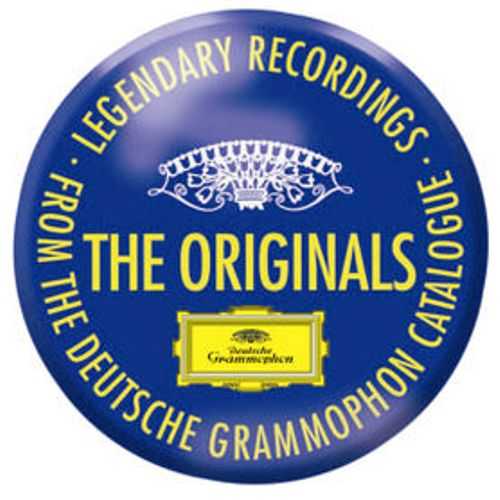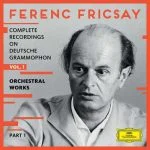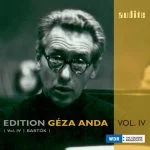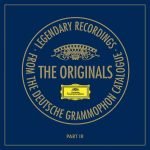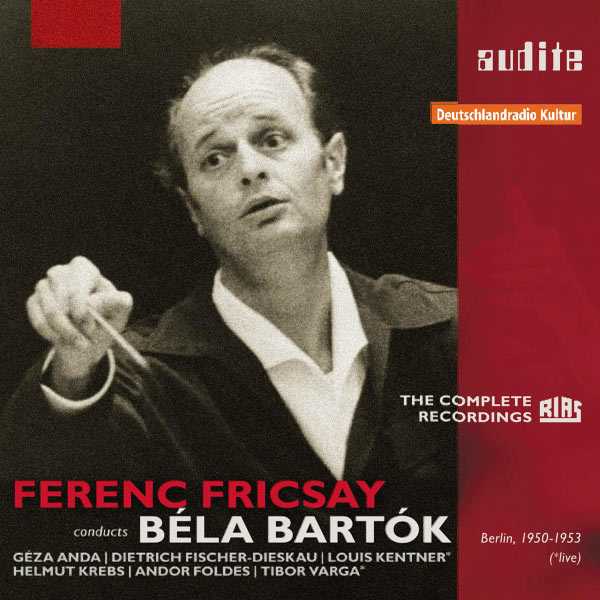
Composer: Béla Bartók
Performer: Tibor Varga, Andor Foldes, Géza Anda, Louis Kentner, Helmut Krebs, Dietrich Fischer-Dieskau, RIAS Kammerchor, Chor der St. Hedwigskathedrale
Orchestra: RIAS Sinfonie-Orchester
Conductor: Ferenc Fricsay
Number of Discs: 3
Format: FLAC (tracks)
Label: Audite
Catalogue: AUDITE21407
Release: 2011
Size: 633 MB
Recovery: +3%
Scan: yes
CD 01
Violin Concerto No. 2, BB 117
01. I. Allegro non troppo
02. II. Andante tranquillo
03. III. Allegro molto
2 Portre (2 Portraits), Op. 5, BB 48b
04. No. 1. Egy idealis (One Ideal)
05. No. 2. Egy torz (One Grotesque)
Cantata profana, BB 100, “A kilenc csodaszarvas” (The 9 Enchanted Stags)
06. I. Volt egy oreg apo (Once there was an old man): Molto moderato
07. II. Az erdoket jarta, hej-haj! (Through forest aroving, hey-yah!): Andante
08. III. Volt egy oreg apo (Once there was an old man): Moderato
CD 02
Music for Strings, Percussion and Celesta, BB 114
01. I. Andante tranquillo
02. II. Allegro
03. III. Adagio
04. IV. Allegro molto
Dance Suite, BB 86a
05. I. Moderato
06. II. Allegro molto
07. III. Allegro vivace
08. IV. Molto tranquillo
09. V. Commodo
10. VI. Finale: Allegro
11. Divertimento, BB 118: I. Allegro non troppo
12. Divertimento, BB 118: II. Molto adagio
13. Divertimento, BB 118: III. Allegro assai
CD 03
01. Rhapsody, Op. 1, BB 36b
Piano Concerto No. 2, BB 101
02. I. Allegro
03. II. Adagio – Presto – Adagio
04. III. Allegro molto
Piano Concerto No. 3, BB 127
05. I. Allegretto
06. II. Adagio religioso – Poco piu mosso – Tempo I
07. III. Allegro vivace
This anthology of Ferenc Fricsay’s Bartók recordings for the RIAS Berlin documents, in a three CD series, a summit meeting of famous Hungarian soloists: the pianists Géza Anda, Andor Foldes, Louis Kentner and the violinist Tibor Varga. Fricsay’s time-tested and congenial vocal soloist, once again, is Dietrich Fischer-Dieskau.
The project of a representative, possibly even complete, recording of Bartók’s oeuvre formed a part of Fricsay’s work from the beginning of his time in Berlin. These RIAS recordings feature almost exclusively Hungarian artists for the solo parts: a novelty at the time. In Fricsay’s view, Hungarian soloists were best suited to realising his precise concept of the close relationship between, on the one hand, Hungarian language and culture and, on the other, interpreting Hungarian music authentically. The only exception is Fischer-Dieskau, whom Fricsay much admired. This compilation from 1951 until 1953 includes all surviving Bartók recordings from the RIAS archives with Fricsay. It begins with opus 1, the Rhapsody for piano and orchestra (1904) and conceived in an entirely Hungarian idiom, and goes via the expressionist, agitated Deux Portraits Op 5 (1907-08) and the powerfully optimistic Dance Suite (1921) up to the masterworks of the 1930s: the neo-baroque influenced Second Piano Concerto (1930-31), the archaic, fairytale-like and darkly coloured Cantata Profana (1932), the splendid Music for Strings, Percussion and Celesta (1935), the lucid Second Violin Concerto (1937-38) and the mysterious Divertimento of 1939 with which Bartók marked the beginning of his inner farewell to Europe. Even today, more than 60 years after these recordings were made, Fricsay’s intensity is perceptible for the listener as an existential experience – both in the impetus and the positive power of the rhythm, and also in the mysteriously resigned and ironically contorted moments in this music which is so rich in nuances. This was made possible by the cooperation with other world-famous alumni of the Budapest Music Academy where Fricsay had himself studied: the pianists Géza Anda, Andor Foldes and Louis Kentner, as well as the violinist Tibor Varga. Dietrich Fischer-Dieskau joined Fricsay as a soloist in the opera Bluebeard’s Castle and the Cantata Profana. His singing (albeit in German) congenially corresponded to Fricsay’s ideal of dramatically thrilling and passionately precise Bartók interpretation.
